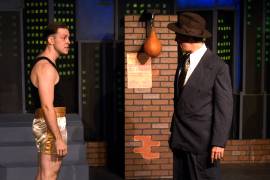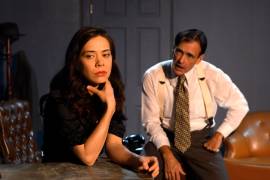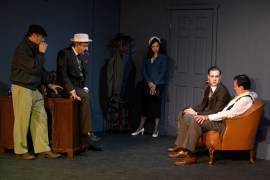
They don’t write plays like Golden Boy anymore, which is just one reason to check out the Stella Adler Lab Theatre Company’s revival of the 1937 Clifford Odets classic. Another is Mattia Bartoli’s electric star turn as violinist turned pugilist Joe Bonaparte.
Odets’ Waiting For Lefty and Awake And Sing may have been more overtly political than Golden Boy, but the then ongoing Great Depression still plays a significant role in second-generation Italian-American Joe’s decision to abandon music for the boxing ring, if only to afford the finer things in life. (A pricey Duesenberg like Gary Cooper’s would be a good start.)
 It’s Joe’s combination of ambition, chutzpah, and self-salesmanship that persuade fight promoter Tom Moody (Jon Boatwright) to give the rookie boxer a try, and when Joe proves victorious his first time in the ring, a potential champion is born.
It’s Joe’s combination of ambition, chutzpah, and self-salesmanship that persuade fight promoter Tom Moody (Jon Boatwright) to give the rookie boxer a try, and when Joe proves victorious his first time in the ring, a potential champion is born.
Unfortunately, news of the boxing neophyte’s win does not sit well with Joe’s old school papa (Joseph D’Agosta), who’s just forked out $1200 ($20,000 in today’s currency!) to buy sonny boy a 21st-birthday birthday violin.
 Complicating matters for Joe is his married manager’s sultry girlfriend Lorna Moon (Denise O’Callaghan), a hard-edge patootie who’s just about given up hope that Tom will ever put a ring on it and might therefore be willing to give Joe’s still hypothetical Duesenberg a spin.
Complicating matters for Joe is his married manager’s sultry girlfriend Lorna Moon (Denise O’Callaghan), a hard-edge patootie who’s just about given up hope that Tom will ever put a ring on it and might therefore be willing to give Joe’s still hypothetical Duesenberg a spin.
With a cast of eighteen (count’em) characters and a structure that leaves little leeway for actors to play multiple roles, Clifford Odets’ Golden Boy is something no contemporary playwright would dare attempt, and few regional theaters could possibly afford to produce.
 Fortunately, for the time being at least, even a play as heavily populated as this one remains doable in L.A. (at 99 seats or less) and the Stella Adler Lab Theatre Company fills the stage with Joe’s nearest and dearest—his sister Anna (Paola Grande) and her Jewish cab driver husband Siggie (Austin Iredale), their handsome union rep brother Frank (Teo Celigo), and family neighbor Mr. Carp (Phillip Estrin)—along with those who populate Joe’s boxing world—his devoted trainer Tokio (Arthur Louis Fuller); gangster Eddie Fuseli (Richard Reich), who wants in on a piece of the Joe Bonaparte action ; Moody’s business partner Roxy Gottlieb (Stan Harrington), eager to share in Joe’s potential millions; dueling sports writers Lewis (Henry Kemp) and Drake (Robert Sprayberry); and dim-bulb boxer Pepper White (Monib Abhat), who’d like nothing better than to put Joe in his place, face down in the ring.
Fortunately, for the time being at least, even a play as heavily populated as this one remains doable in L.A. (at 99 seats or less) and the Stella Adler Lab Theatre Company fills the stage with Joe’s nearest and dearest—his sister Anna (Paola Grande) and her Jewish cab driver husband Siggie (Austin Iredale), their handsome union rep brother Frank (Teo Celigo), and family neighbor Mr. Carp (Phillip Estrin)—along with those who populate Joe’s boxing world—his devoted trainer Tokio (Arthur Louis Fuller); gangster Eddie Fuseli (Richard Reich), who wants in on a piece of the Joe Bonaparte action ; Moody’s business partner Roxy Gottlieb (Stan Harrington), eager to share in Joe’s potential millions; dueling sports writers Lewis (Henry Kemp) and Drake (Robert Sprayberry); and dim-bulb boxer Pepper White (Monib Abhat), who’d like nothing better than to put Joe in his place, face down in the ring.
Though written to be a money-making crowd-pleaser, Golden Boy still manages to make its points. Is a “blood sport” like boxing any more violent than the world around us? Does pursuing a career in the arts make sense in a time of economic distress? Can success ever overcome shame?
 Under Rick Peters’ direction, newcomer Bartoli positively ignites the Stella Adler stage with charisma, depth, charm, pathos, sex-appeal, heart, and a New York accent that proves even more impressive when you realize English is the Rome-born actor’s second language.
Under Rick Peters’ direction, newcomer Bartoli positively ignites the Stella Adler stage with charisma, depth, charm, pathos, sex-appeal, heart, and a New York accent that proves even more impressive when you realize English is the Rome-born actor’s second language.
The gorgeous O’Callaghan starts off a bit one-note as Lorna, but the deeper she gets involved with Joe, the more layered her work becomes. Stage-and-screen vet D’Agosta gives a heart-touching performance as Joe’s father, Boatwright is an effectively conflicted Tom Moody, and Reich makes for a dynamic mafioso with a skeleton in his closet (accent on closet).
Golden Boy’s cast also includes Mitch Holden (Mickey), Steven Bridgeman (Sam), Job Camarena (Driscoll), and Don Baldaramos (Barker), with Fuller, Estrin, Abhat, Grande, and Iredale standing out among the crowd, the latter a particular delight as the big-talking Siggie opposite raven-haired stunner Grande’s fiery Anna.
On a less positive note, some occasionally sluggish pacing is exacerbated by so many time-consuming scene changes that a full ten minutes get added to Golden Boy’s already 140-minute running time.
Scenic designer Alain Villeneuve smartly takes advantage of a stage wide enough for three distinct playing areas, the Bonaparte apartment the most niftily rendered of the three, however characters on one side don’t need to wait for a scene playing on the other side to end in order to take their places for the following scene, and centerstage set pieces don’t have to be laboriously moved offstage each and every time the scene switches to stage right or left.
Most serious of all, scene changes need not take place in deafening silence. Though sound designer Rabih Saadeh’s does give us Odets’ script-dictated effects, what is sorely lacking is a drama-enhancing musical soundtrack, the kind that most professional L.A. productions consider a must.
Lighting designer Brandon Baruch does make the most of the Stella Adler Theatre’s limited resources, Michelle Petit’s combat makeup is excellent, and the uncredited 1930s costumes could not be better.
Golden Boy is produced by Rochelle Rossman. Viviane Borelli is stage manager. Violinist Lesa Terry has prerecorded the 2nd Movement of Beethoven’s 5th Sonata.
Even with its flaws, Golden Boy at the Stella Adler gives L.A. theater lovers reason to rejoice in the rediscovery of a Golden Era classic, and one thing is certain. Whenever Mattia Bartoli is “in the ring,” the production is a knockout.
Stella Adler Theatre, Irene Gilbert Theatre, 6773 Hollywood Boulevard, Hollywood.
www.goldenboy-la.com
www.StellaAdler-LA.com
–Steven Stanley
June 19, 2016
Photos: Julio J. Vargas
Tags: Clifford Odets, Los Angeles Theater Review, Stella Adler Lab Theatre Company



 Since 2007, Steven Stanley's StageSceneLA.com has spotlighted the best in Southern California theater via reviews, interviews, and its annual StageSceneLA Scenies.
Since 2007, Steven Stanley's StageSceneLA.com has spotlighted the best in Southern California theater via reviews, interviews, and its annual StageSceneLA Scenies.







 COPYRIGHT 2025 STEVEN STANLEY :: DESIGN BY
COPYRIGHT 2025 STEVEN STANLEY :: DESIGN BY